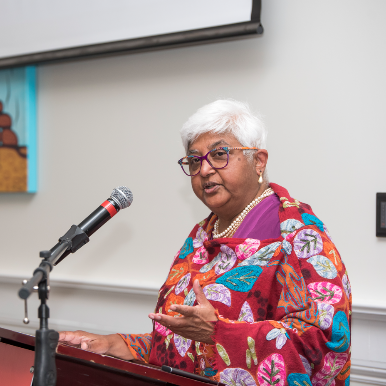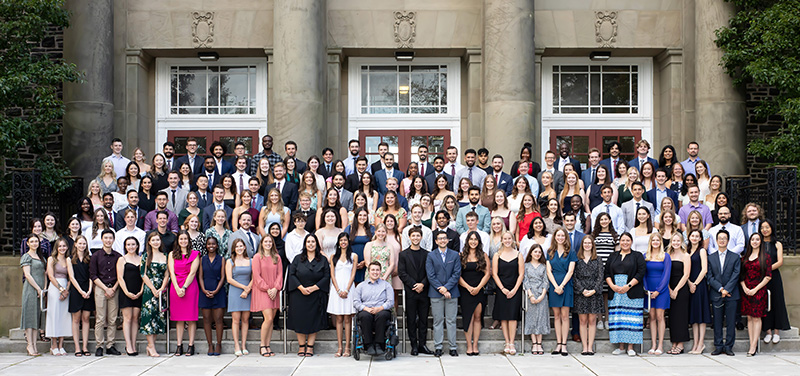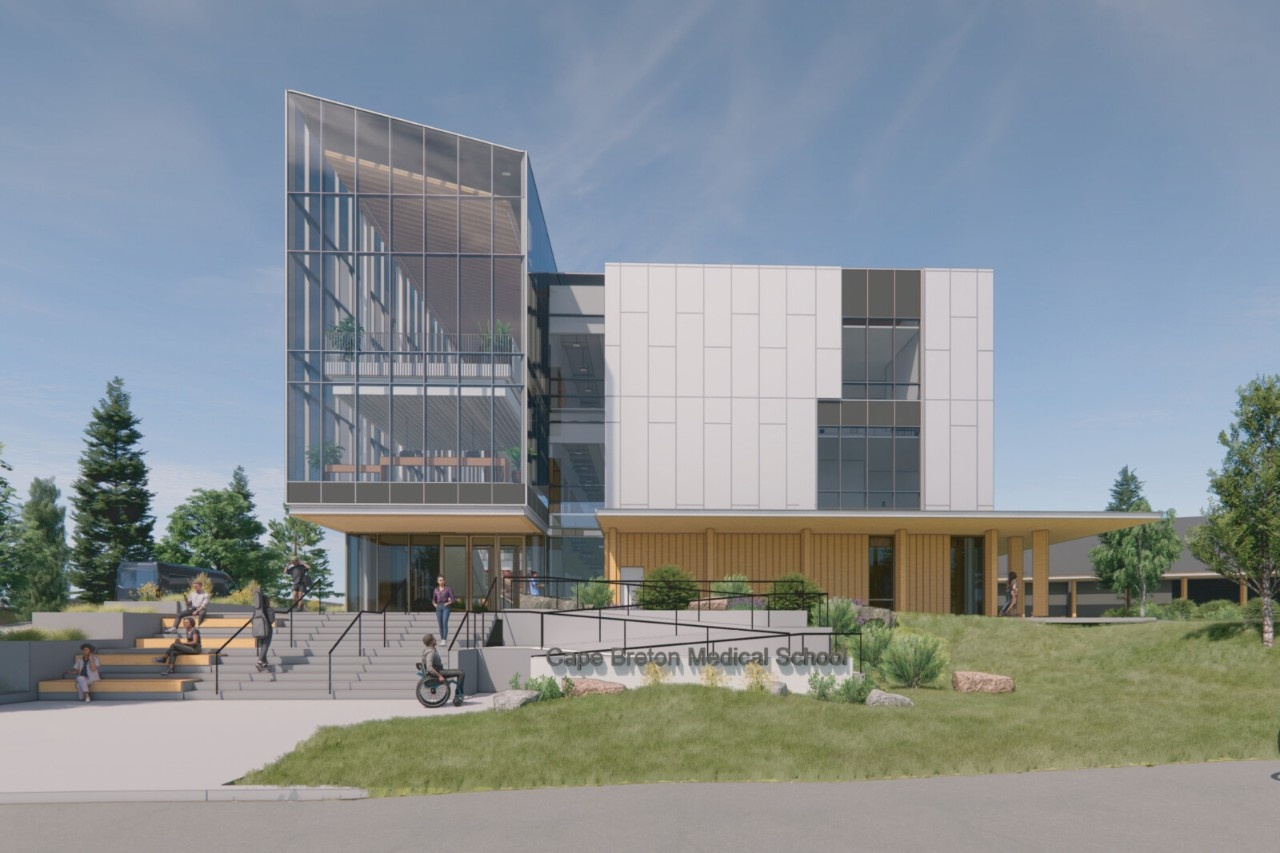Cape Breton Medical Campus
» Go to news mainSeptember 2023 Newsletter

The Future Will See You Now

Dr. Sarita Verma (pictured above) believes that healthy communities are wealthy communities and has built a collaborative environment to develop and adopt health-care solutions in Northern Ontario.
Visiting Cape Breton University on June 26, 2023, she shared her knowledge as the President, Vice Chancellor, Dean and CEO of NOSM University.
The Northern Ontario School of Medicine (NOSM) made history by becoming Canada’s first independent medical university in April of 2022. Its impact is broad and growing. The university fosters a culture of mutual respect and trust, believing that training in the north, by the north, for the north, works. And the numbers tell the story: of the 559 physicians who completed their MD at NOSM, 284 practice in Northern Ontario, while 390 out of the 689 physicians who completed their residency at NOSM University now practice in Northern Ontario.
Members of the teams involved in the implementation of the Cape Breton Medical Campus had an opportunity to learn more about the NOSM University experiences and successes when Dr. Verma and Gina Kennedy, University Secretary and Director, Office of the President, visited.
NOSM is committed to social accountability to drive change and improve access to quality health care in Northern Ontario. Their approach is unique in many ways, with admission processes shifting the focus away from traditional MCAT scores, and placing criteria on geographic and cultural factors. These factors include those living in rural areas, as well as Indigenous and Francophone populations.
The school takes learners out of the traditional classroom, and like the Cape Breton Medical Campus, is focused on family medicine. At NOSM, there are two main campuses – one in Sudbury and one in Thunder Bay, totalling over 1,000 kilometres between the two sites. The distributed learning model is far reaching, with 15 communities involved in Northwestern Ontario, and 33 communities involved in Northeastern Ontario.
Economic impact for the area has also been significant. In 2019, direct program and learner spending in Northern Ontario was $64.6 million while the total economic impact in Northern Ontario was estimated at $107 million. Physicians trained at NOSM and practising in the region added $88 million in revenue. Graduates are closely tracked. Fifty per cent have stayed in Northern Ontario and Dr. Verma believes graduates have chosen family medicine because of the excellent learning experience they have had, along with the presence of capable family medicine physician role models.
Overall, Dr. Verma is very impressed with the collaborative relationship that has been established between Dalhousie University's Faculty of Medicine and Cape Breton University, and the progress made to date. She has promised to provide support and advice as the project proceeds.
When charting Cape Breton and Dalhousie University’s new territory, learning from one of Canada’s greatest human health resource success stories will only help map out a solid road to success.
Leading the Way—A Physician’s Perspective

Interim Associate Dean of Cape Breton’s medical campus, Dr. Kevin Orrell (pictured far right) is one of the leaders tasked with creating the campus, believing it will have an astounding impact on Nova Scotia by helping to address the shortage of human health resources across the province.
With a focus on family and rural medicine, the goal is to ensure more doctors choose family medicine as their specialty.
Dr. Orrell recognizes there are many challenges within today’s health care system and notes the shortage of family physicians among its most important. He believes solutions can be found through new approaches and creative thinking. "In days gone by, problem solving happened in silos, and therefore the focus wasn’t on the bigger picture,” says Dr. Orrell. “Today, we see significant benefits in looking at the issues from a provincial perspective, and finding solutions that work on a broader scale.”
The planning around the medical campus will be firmly focused on the future. The government of Nova Scotia intends to increase the province’s population to two million by 2060, meaning increased demands on the health care system. “The Cape Breton Medical Campus will have versatility built in to respond to changing and increasing needs over time,” says Dr. Orrell.
The Associate Dean’s main goal is to ensure students receive a first-class medical education, producing graduates who are well trained and competent in delivering care to their patients. “We must create clinical facilities that provide an exceptional experience for students with a focus on family and rural medicine,” Dr. Orrell notes. “We also must ensure the community is involved so that students are welcomed in the areas they may seek to practice within.”
Dr. Orrell also sees a focus on the social determinants of health as critical for the new campus. The prevalence of diabetes, hypertension, and cancer within our communities offer a natural focus for research, eventually leading to an improvement in overall health outcomes.
The campus will offer a chance for some very qualified students to study here at home. “So many students have had to study in other areas of the country or abroad to obtain their medical degree. This provides another very welcome alternative,” notes the doctor.
The impact on our community and our province will be significant with Dr. Orrell adding that “This campus will produce competent family medicine physicians that will help improve access and outcomes. Family medicine is a critical and important specialty, and we are proud to open this world of possibilities for our future students.”
Welcome to the Class of 2027

On August 20, we held our annual Dean’s Welcome Ceremony in Halifax to welcome first-year medical students to Dalhousie Medical School and to the practice of medicine.
The number of undergraduates we admit into the program has expanded to meet the ever-growing regional need for physicians. This year we welcomed our largest class to-date with 147 talented students beginning their first year of medical training, which included five students in the second cohort of the Cape Breton University and Dalhousie University Medical Education Pilot.
With this pilot, CBU sponsors five seats at Dalhousie Medical School for qualified rural Nova Scotian applicants including Cape Breton, Mi’kmaq and other Indigenous and African Nova Scotian individuals. The five students have committed to return of service criteria including committing a focus on family medicine, and working as a family doctor in rural Nova Scotia for five years after completing their degree.
Congratulations to the Class of 2027. We can’t wait to see what you achieve.
Faculty Development
The Dalhousie Medical Certificate in Clinical Training, designed to help clinical faculty become better teachers is being offered online in October 2023.
Fundamentals of Teaching: Fundamentals of Clinical Teaching and Supervision is being offered from November 17-December 19, 2023.
The professional Development Seminar and Podcast Series begins September 19, 2023 with Immersive Learning Environments: An overview of virtual and augmented reality in healthcare education—the what, why and how?
The Leadership PRN Series with Dr. Lara Hazelton, Co-Director of Faculty Development speaks with experts about the joys and challenges of leading in the medical environment. New episodes are released on the first Wednesday of each month.
Medical Education Research Roundtables begin in October on the second Tuesday of each month. The webinars include:
What makes a good qualitative interview?
An introduction to qualitative coding using NVivo data analysis
More systematic reviews: Choosing appropriate evidence synthesis methods for health professions education topics.
When available, the MS Teams link will be posted. Questions can be directed to Ana Bela at anabeta.sardinha@dal.ca
Questions about faculty development can be directed to FacDev@dal.ca
